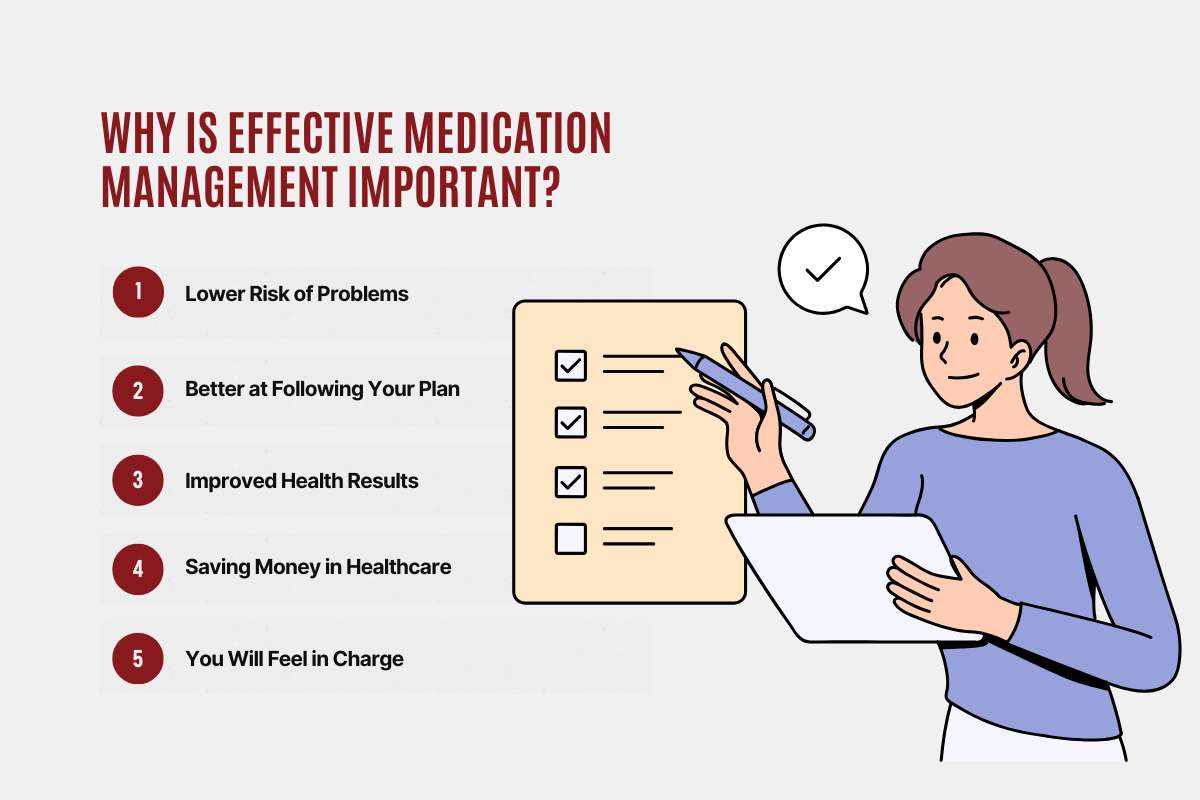How Can You Improve Drug Intake Coordination?
How Can You Improve Drug Intake Coordination?
Blog Article
Share Now:
LinkedIn
Twitter
Facebook
Reddit
Pinterest

- Source: IMages by Science Photo Library
Most of the time, looking after oneself means attending to several medicines at the same time. Most people have several prescriptions from different doctors, along with over-the-counter meds and supplements. This type of thing can get confusing and may inevitably lead to errors and harmful side effects. Thus, it is a huge advantage to maintain a clear and organized plan for taking this very medicine. The purpose of this guide is to help understand the importance of effective medication management and provide simple strategies to facilitate drug intake coordination, thereby staying safe and achieving the full potential of the treatment.
The growing challenge of polypharmacy
Polypharmacy means the concurrent use of multiple medicines and is becoming more common, especially among older adults and those with chronic health problems. Drugs are critical to illness management. The combination of multiple drugs thus enables a potential change in the incidence of problems such as drug-drug interaction, drug side effects, or considerable errors in execution. This may, in turn, cause events that may result in hospitalization, decreased quality of life, or even death.
Why is effective medication management important?

- Lower Risk of Problems: Careful management of medication can reduce the chance of two drugs interacting unfavorably with each other, causing side effects that make people sick.
- Better at Following Your Plan: If you have good directions, a people-friendly plan, and support, taking medication in a timely way is very much easier for you.
- Improved Health Results: Good medication compliance with your prescribed anticancer medications means that, most times, they will work the way they should.
- Saving Money in Healthcare: You would save unnecessary doctor visits and hospital stays and end up saving money.
- You Will Feel in Charge: By helping to manage your medications, you learn to promote your health and become confident.
Good medication management is one of ongoing cooperation among peers and their doctors, teaching people to be healthy and in control via self-care treatment choices.
Key Components of Successful Medication Management Systems
For safe and effective medication use, all hands should be on deck; clinicians, patients, and pharmacists should cooperate to achieve this goal. The basic steps for safe and effective medication use are:

- Know Your Medications: Keep a complete list of medications, including prescriptions, over-the-counter drugs, supplements, and vitamins. They include information as to the names of the medications, dosages, frequency of drug intake coordination, and indications.
- Check for Mistakes: Always check your medication list against what you’re taking, especially when being admitted to a hospital or when changing care providers. This helps to correct any mistakes and catch any missing information.
- Learn About Your Medications: Make sure you learn the purpose of each medication, how to take it, possible side effects, and any precautions. If there is a consideration you can’t understand, do ask questions!
- Reviewing: Let your doctor or pharmacist review your medications occasionally to make sure they’re still appropriate for you and to readjust doses or tackle other issues if needed.
- Stay Connected: Stay in touch with the teams on health care and share any side effects or concerns with them; do not hesitate to ask for help.
- Use Useful Tools: Various technologies, like medication reminder smart apps, pill organizers, or electronic health records, all help in compliance.
Together, we can make sure of your involvement in managing thirteen physiological processes by common changes and resulting improvement of health quality.
Strategies for Optimizing Drug Intake Coordination
Following all the correct procedures when taking your medications is crucial to becoming fit and healthy. Here are some simple strategies to help you stay on track:
- Create a Medication List: List all of your medications, including how much you take and when. Okay, share this list with your doctors and pharmacists.
- Establish a Schedule: Establish a routine for taking your medications and the best time to fit this routine into your daily activities to avoid missed doses.
- Use Pill Organizers: Organizers help sort medications by the day and hour so the right pills can be taken at the right time.
- Set Up Reminders: Set alerts or alarms on your team, text alerts-and-a-call-to-friends-to-Make-sure-That-you-M-Fectly-Had-Medications-Most-of-the-Time-M-An-M-
- Speak With Your Health Team: Monitor the doctors or pharmacists you’re working with to ask questions or voice concerns about your medications.
- Watch Interactions: Be aware of what your medications could be interacting with-such as other medications, supplements, or certain foods. These potential interactions can be explained by a pharmacist if issues arise before or after starting a medication, for example, vomiting, sedation, dizziness, confusion, or rash. The C- system of the second instruction would involve consulting with the doctor upon compliance.

The Role of Pharmacists in Drug Intake Coordination
The societal contribution to the patients in providing information and guidance on medication use is crucial. Pharmacists are experts in drugs and their interactions with each other. This is how they can help:
- Reviewing Medications: Pharmacists check all the medications the patients are taking to find and solve problems such as wrong doses or harmful interactions – Medication Therapy Management (MTM).
- Verification/Making Sure It Is Right: They may carry out a Medication Reconciliation, where the patient’s drugs are identified and done in the correct quantity.
- Patient Education: The information from pharmacists includes how to take medications properly, which side effects to note, and how different medications may interact.
- Doctors: They work with other healthcare providers to adjust medication plans and improve patient care.
These pharmacists constitute a crucial component of the healthcare team to keep patients safe and help them achieve optimal therapeutic outcomes.
Empowerment of Patients in Coordinating Their Drug Intake
Patients play a strong and active role in drug intake coordination. They should take control of their drug intake coordination and find ways to keep up constant communication with their healthcare providers. Here are ways that can empower patients:
- Keep a Medication List: Always have an updated list of all medications, including prescription drugs or over-the-counter medications.
- Questions: For patients who are unclear things or doubt medication prescriptions should be clarified with their treating doctors.
- Notification of Side Effects: Patients should contact their healthcare providers about any side effects experienced or concerns that arise with medications.
- Adherence to Instructions: Take medication exactly as described.
- Knowledge of Interactions: Seek attention to drugs that interact with each other.
Conclusion
Administering medications correctly is crucial to keeping patients safe and ensuring treatments work appropriately. This guide provides general tips to minimize the risk of taking multiple medications for patients, doctors, and pharmacists alike. Effective medication management depends on active communication, effective teamwork, and engaging patients in their care. By working on organizing, coordinating, and making sure drugs are taken the right way, we facilitate a much safer and healthier experience for all concerned.